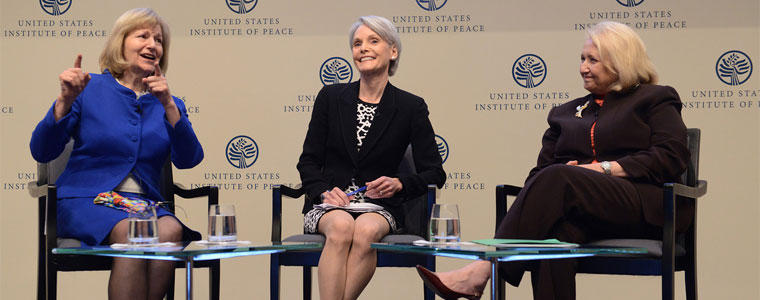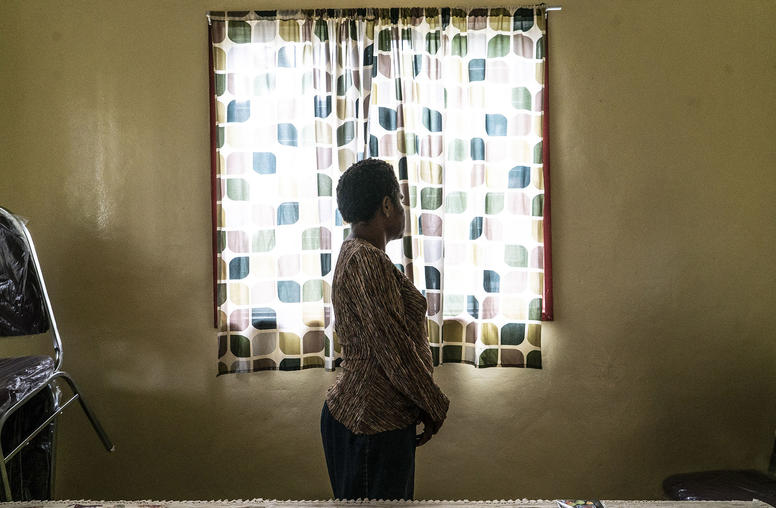A recent discussion at USIP to explore the role of women in peace efforts, the second annual Sheikha Fatima lectureship, naturally landed on the disturbing case of 276 girls abducted and being held captive in Nigeria by the extremist group Boko Haram.

Baroness Emma Nicholson of Winterbourne, a member of the British House of Lords, and former top State Department official Ambassador Melanne Verveer addressed the continuing shortage of women leaders worldwide and the connection to the menace of violence against women. The two leaders delivered keynote remarks at the May 8th event, named in honor of Sheikha Fatima Bint Mubarak, the widow of the founder and former president of the United Arab Emirates (UAE) and an active advocate for strengthening the role of women in society.
"This whole issue of violence against women is a global scourge, and it is particularly heinous in conflict zones," said Verveer, when asked about the Nigeria case by moderator Jill Dougherty, a former CNN correspondent who is a fellow at Harvard University's Joan Shorenstein Center on Media, Politics and Public Policy. Verveer, who became the first U.S. ambassador-at-large for global women's issues in the State Department, moved last year to the Georgetown Institute for Women, Peace and Security as its inaugural executive director.
Verveer cited the United Nations Security Council resolution that was adopted in October 2000 and that calls for protecting women in conflict zones and involving them in security-related decision-making. She lamented the still unfulfilled "responsibility of governments to protect women and girls from violence, which is part of international law."
In the Nigeria case, the government has faced public criticism for not acting more quickly to rescue the abducted girls. Boko Haram's leader in Nigeria said the group seized the teenaged girls to prevent them from attending school because they should be married instead. More than 300 teens reportedly were captured on April 15. While some escaped, 276 remain missing. The militant group this week released a video showing some of the girls and said none would be let go until the government releases Boko Haram fighters it has in custody.
Nicholson, who founded the AMAR International Charitable Foundation in 1991 to aid Marsh Arabs fleeing the rule of Saddam Hussein in Iraq, said education, including on human rights, is key to eliminating violence against women and girls. AMAR has expanded to serve neglected populations throughout the Middle East and South Asia.
Education teaches "that we must respect each other, that there is value in each other, that we must not just tolerate difference -- we must embrace" it, Nicholson said. "This doesn't just come automatically."
USIP conducts a range of programs in conflict zones worldwide to strengthen the role of women in peace and security. In Nigeria, that includes a project to train mothers and female religious leaders to recognize the process of radicalization and how to steer youths away from extremism. In Afghanistan, USIP funded a conference organized by a local group of women in civil society to give them an opportunity to discuss issues with presidential candidates prior to the recent elections.
"Definitions of leadership are often drawn from war, and until very recently, most wars have been fought mainly by men," said Kathleen Kuehnast, USIP's director of the Center for Gender and Peacebuilding. Events such as the Sheikha Fatima lectureships provide an opportunity "to expand our notions of leadership to be inclusive of peacebuilding and inclusive of women," she said.
Among efforts to end sexual violence against women is a campaign by British Foreign Secretary William Hague to raise the issue within the G-8 grouping of economic powers, Verveer said.
"He is pulling together an international summit in ways that I hope will have greater impact," she said. "What is missing is the appreciation at the highest level, where the decisions get made."
Verveer cited one ray of hope recently -- a historic peace agreement signed in March between the Philippine government and Muslim rebels to end a decades-long conflict in the southern area of Mindanao that has cost an estimated 120,000 lives.
"It is the first agreement negotiated by a woman, and a woman's signature is on the peace agreement," Verveer said. An advisor to the president of the Philippines also was a woman. "When women are at the table, issues like transitional justice, issues like economic opportunity, issues like reconciliation and recognition of human rights get addressed."
Verveer praised the role of women in the UAE, including female members of the Cabinet such as Sheikha Lubna Al Qasimi, who held two other ministerial posts before her current position as minister for international cooperation and development. She was on Forbes magazine's 2013 list of the 100 most powerful women in the world. Businesswoman Raja Easa al Gurg, the managing director of a development conglomerate, was on the cover of Forbes Middle East for her advocacy of female entrepreneurship.
Another woman heads a state-of-the-art center in Dubai where women physicians and lawyers address the issue of women and children who have been trafficked into the UAE. Verveer said the center is a model for the region.
Nicholson, whose ancestors have included politicians going back many generations, said the push for more women in leadership is "important and it's important that we are all part of it. It is something that all of us need to be involved in, in a very practical way, every single day."
She told the story of then-leader of the Conservative Party Margaret Thatcher asking her to take a position as vice chairman to help recruit more female candidates. Nicholson was one of the directors of the British Save the Children Fund at the time.
A look at the roster for the next House of Commons elections for 650 seats showed only eight names of women, and even those asked to be bypassed, saying they'd only agreed to be added so that it wouldn't look too bad for the party, Nicholson said. Over time, the number of women in the British Parliament rose significantly, she said. She went on to become a member of the House of Lords, chairing the All Party Parliamentary Group on Foreign Affairs and was a member of the European Parliament for 10 years.
Still, the number of women in Britain's Parliament falls short of the roughly 50 percent who should be represented, she said. As of 2012, women comprised about 23 percent of both houses of Parliament, according to the legislative body's website.
"Still too few," Nicholson lamented. "Still too few."



